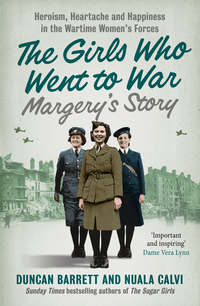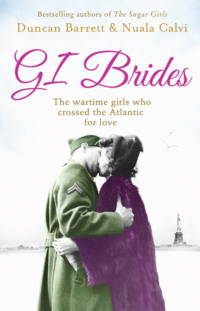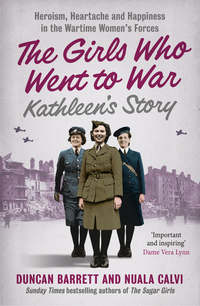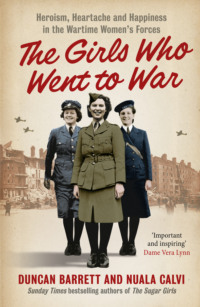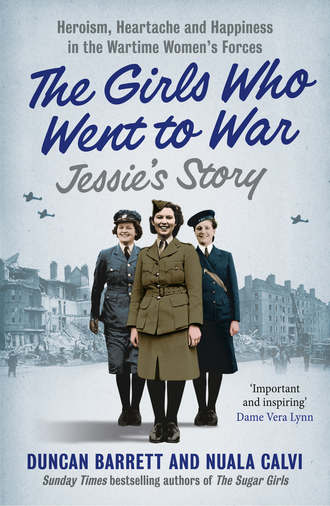
Полная версия
Jessie’s Story: Heroism, heartache and happiness in the wartime women’s forces
‘Looking for you, of course,’ the soldier replied cheekily. ‘I’ve just been round to your house and your mum said you’d be coming along this way.’
He must have got my address off Mrs Hedqvist, Jessie thought. She couldn’t help smiling.
‘Would you mind if I cycle with you?’ the young man asked politely. ‘I thought you might like some music on your way home.’ As they pedalled away, he began singing ‘Wish Me Luck As You Wave Me Goodbye’, one of the songs Jessie had played for him the day before. She noticed that he remained perfectly in tune throughout, and his delight in the music shone through just as it had in the drawing room at Bleak House.
‘That was lovely,’ Jessie told him when he came to the end of the song.
‘I’m glad you liked it,’ he replied. ‘I take requests too, you know.’
Jessie laughed. ‘All right, how about “Run Rabbit Run”?’ she suggested.
The man launched into a spirited rendition of the song, and for the rest of the two-and-a-half-mile journey, he kept her entertained with one tune after another.
In between songs, Jessie learned that the young man’s name was Jim Winkworth, and that he had worked in the kitchen of a top London restaurant before joining the Army Catering Corps. ‘I’m in charge of the food for all the bigwigs,’ he explained.
‘Well, I suppose you could say I work in catering too,’ Jessie replied, ‘but we mostly serve truckers, not Army top brass!’
‘Oh, I’d swap with you any day,’ Jim told her. ‘You’d be surprised at the table manners of some of the majors and colonels.’ But it was clear when he talked about the fancy dinners they laid on for the officers at Bleak House – with the finest crystal and silverware the grand stately home had to offer – that he loved his job very much, and took great pride in getting every detail just right. ‘When I was out in France, we’d have killed for a pantry stocked as well as the one they have here,’ he told her wistfully.
‘You were in France?’ Jessie asked, surprised.
‘Oh, yes,’ Jim replied. ‘I was sunk twice on the way back from Dunkirk, but both times I got pulled out of the water. In the end I came back on a little fishing boat.’ He grinned at her. ‘I guess I must have just been born lucky.’
‘Most people would call being sunk twice pretty bad luck!’ Jessie pointed out.
‘Well,’ Jim shrugged, ‘there’s plenty of men who didn’t make it back at all.’ After a moment’s silence, he began to sing again. Clearly whatever horrors he had seen had only made him more determined to embrace the joy of life.
When they got to Holbeach Bank, Jessie invited Jim in for a cup of tea, and soon he was entering her parents’ little house for the second time that afternoon.
‘Oh, he found you then?’ Mrs Ward commented dryly as Jessie ushered the young man into the kitchen.
‘Yes, Mum,’ Jessie replied, hoping her mother wasn’t going to be rude to him.
‘So, Jim, where do your family come from?’ Mrs Ward asked, as she plonked the teapot down on the table, gesturing for Jessie to pour the tea.
‘To be honest, I have no idea,’ he told her. He explained that he had spent his childhood in a Dr Barnardo’s orphanage in Hastings and had never found out who his parents were.
As she listened to the sad story, Jessie’s heart went out to Jim, but his words had a different effect on her mother. ‘I’m not keen on that one,’ she told Jessie, after the young man had set off back to Bleak House. ‘He’s got no family, no background. You don’t know who he is.’
‘Neither does he, Mum,’ Jessie reasoned. ‘You can’t hold that against him.’
But Mrs Ward shook her head firmly. ‘You don’t want to get involved with him,’ she said.
Jessie took little notice of her mother’s advice, however, and soon Jim was stopping by at the greasy spoon several times a week to see her. They spent hours at a time cycling around the countryside together, pausing every now and then for a kiss and a cuddle, until it was time for him to accompany her back home.
Jim hadn’t failed to notice Mrs Ward’s coolness towards him. ‘I don’t think your mother likes me,’ he told Jessie one day, as they were cycling back to Holbeach Bank.
‘Oh, don’t worry. She doesn’t like anyone!’ Jessie replied, trying to make light of the situation.
But Jim was uncharacteristically serious. ‘You know, it’s hard for me to meet new people,’ he told her. ‘They always want to know about my family.’
‘Well, I don’t care who your parents are,’ Jessie declared. ‘And anyway, the way some families are, you’re probably well off without one!’
But despite Jessie’s words, Jim was determined to win her mother over. One evening, he turned up at the little house in Holbeach Bank bearing an enormous fillet of smoked salmon. ‘Don’t worry, I haven’t stolen it,’ he told Mrs Ward when he saw the suspicious look in her eye. ‘We over-ordered at the officers’ mess and it was going to be thrown in the bin.’
‘Well, in that case, I suppose we’d better eat it,’ Jessie’s mother replied, taking the fillet off to the kitchen.
When the food was served, even Mrs Ward had to admit that the salmon was delicious, and fresher than anything the family had eaten since the start of the war. But her frostiness towards Jim didn’t thaw one bit.
Mr Ward, on the other hand, clearly enjoyed having a soldier in the house. ‘You know, the cooks are the most important people in the Army,’ he declared over dinner, looking over approvingly at Jessie’s guest. ‘When I was in the trenches, they were the ones who kept our peckers up. As Napoleon said, an army always marches on its stomach!’
After Jim had left at the end of the evening, Jessie’s father turned to her. ‘I like that young man,’ he said. ‘And I’m glad that he’s an Army lad, not one of those stuck-up Navy or Air Force types.’
But despite the wonderful salmon, the expression on Mrs Ward’s face made it clear that her opinion of Jim hadn’t altered one bit.
Jessie soon discovered that Jim was forming his own views about her mother as well. ‘You know, you take too much notice of her,’ he announced one day while they were out cycling. ‘You shouldn’t let her boss you about so much.’
‘Well, there’s no point arguing with her,’ Jessie told him. ‘It only makes things worse.’
‘Maybe,’ Jim replied. ‘But don’t let her keep you under her thumb.’
The more time Jessie spent with Jim, the more she felt herself falling in love with him – but her feelings were of no concern to the Army. One day, out of the blue, orders went up at Bleak House announcing he was being transferred to Sleaford, 25 miles away. There were no more romantic bike rides after work, and Jessie found she missed Jim terribly.
Fortunately, he was billeted with a kind local vicar who allowed him to use the phone once a week. He would write to Jessie and let her know what time he would be calling, so that she could queue up at the phone box in the village for a quick snatched conversation. It was wonderful to hear his voice, even only briefly, but afterwards she always returned home glumly, knowing it would be another seven days before they could speak again.
Before long, Jim was sent even further away, to Woodhall Spa, where they could no longer even talk on the phone. Now Jessie lived for his letters, which arrived faithfully every other day. He was a natural writer, and the two of them filled pages and pages with heartfelt reminders of their love.
When Jim wrote one day and asked Jessie if she would marry him, she knew instantly that her answer was yes. But she also knew that her mother would do her best to talk her out of it.
Jim’s words echoed in Jessie’s mind: ‘Don’t let her keep you under her thumb.’ She picked up a pen and quickly wrote back accepting Jim’s proposal, making sure the letter was signed, sealed and posted before she went in to tell her parents the news.
‘Jim’s asked me to marry him – and I’ve said yes,’ she announced excitedly, when she found them together in the living room.
Mrs Ward shot an annoyed look at her daughter, but she could see it was too late to change her mind. Instead she said coldly, ‘Well, you’ll have to wait until the war’s over. It would be very unwise to marry before then.’
Jessie was determined not to give too much ground. ‘We’ll have to wait and see,’ she said boldly.
Her father grinned at her. ‘I don’t mind what you do love, as long as you’re happy,’ he said.
A few weeks later, when Jim was granted a day’s leave, he and Jessie met up in King’s Lynn. There he presented her with the most beautiful ring she had ever seen – it was made of platinum and encrusted with tiny diamonds.
As much as Jessie was thrilled about her engagement, it made life at home even more difficult. Her relationship with her mother was frostier than ever, and she realised that, even if she did defy her and marry Jim while the war was still raging, with the Army moving him around constantly, she would still be stuck at home until he was finally demobbed.
It didn’t look like the war would be over any time soon, either. When they gathered around the wireless in the evenings, Jessie and her family heard reports of aerial bombings in London, Birmingham, Liverpool and other big cities, including nearby Peterborough. A few bombs had even landed near Spalding. ‘Those blooming Germans are walking all over us,’ Mr Ward fumed.
Jessie was beginning to wonder what she was doing to help with the war effort. All she did was spend her days serving beans on toast. Surely there was something more she could do – perhaps even something that would have the added bonus of getting her out of Holbeach Bank.
Ever since Dunkirk, stories had been circulating about the brave ATS girls who had travelled to France with the British Expeditionary Force. Some had heroically escaped after having been captured by the Germans, while others had endured terrifying dive-bombing by the Luftwaffe. Their efforts had proved that the women’s forces deserved to be taken seriously, and now a massive recruitment drive was underway.
Jessie had seen the posters and advertisements up around the village, calling for girls to join the ATS – ‘YOU ARE WANTED TOO!’ they proclaimed in large, bold letters, alongside an image of a young woman marching in uniform. Jessie liked the idea of joining the Army, like her father, and when she wrote to tell Jim about her idea he was supportive. But she had a feeling that if she spoke to her mother, she would try to put a dampener on her plans.
When a friend who lived ten miles away in Boston invited Jessie to come and visit her for the weekend, she realised it was the perfect opportunity for her to join up without any interference. She took the bus into Grantham, where she knew there was an ATS recruiting office, and was ushered into a hall where a male Army sergeant was seated behind a desk. He took down her name, address and date of birth, and told her she would be hearing from them shortly.
‘I’ve signed up for the ATS,’ Jessie told her parents, as soon as she got back home after her holiday.
Mrs Ward didn’t even look up from her knitting. ‘Well, the Army ought to teach you what hard work is,’ she muttered.
‘I don’t mind working hard,’ replied Jessie. After all, her mother had been treating her as a domestic drudge for years.
Mr Ward, of course, was over the moon at the thought that he was going to have a daughter in khaki. ‘My Jessie’s going to win us the war, you know,’ he began telling anyone in the village who would listen.
Now that she had made the decision to join up, Jessie’s excitement was growing, but it soon began to be mingled with impatience. She had volunteered in December of 1941, and had been rated ‘A1’ at a medical exam in Grantham just before Christmas, but she was told that it wouldn’t be until the new year that the Army would get around to calling her up.
At long last, one crisp January morning, an official-looking envelope arrived on Jessie’s doormat. She tore it open to find a railway warrant and instructions for getting to an ATS training camp at Leicester the next day. She was to bring just one small suitcase, containing two pairs of pyjamas.
Jessie didn’t own any pyjamas, so she rushed into Holbeach to buy some, stopping off along the way to let her boss at the greasy spoon know that she was leaving to join the Army. ‘Well, I can’t argue with that!’ the woman said, wishing her luck.
The next morning, Jessie was up bright and early, ready to begin the journey to Leicester. To Mr Ward, it was a red-letter day, although his wife treated it just like any other. As far as she was concerned, Jessie might have been setting off for her usual shift at the cafe, not leaving home for the duration of the war.
Right now, though, nothing could dampen Jessie’s spirits, and she walked the two and a half miles to Holbeach Station fizzing with excitement. At the station, she presented her railway warrant and boarded a train to Spalding, where she had been instructed to make a connection that would take her to Leicester.
As she got on the second train, Jessie spotted a couple of girls she recognised from her medical in Grantham, and soon they had introduced themselves and were chatting away. One of them, Mary, was tall and slim, and carried herself with an air of quiet confidence. The other, Olive, was more cuddly-looking, with glasses and an infectious laugh.
As they got to know each other, the girls talked about their reasons for joining the ATS. Olive, it turned out, had signed up after a love affair turned sour. ‘I just got so fed up that I had to leave!’ she told Jessie and Mary with a giggle.
When they arrived at Leicester station, the girls were met by a railway transport officer, who pointed them in the direction of a fleet of ATS lorries. They clambered up over the tailgate of one of the vehicles, along with a group of other young women. They were all anxiously clutching little suitcases, with the same expression of bewilderment on their faces. They didn’t exactly look like an Army in waiting.
When the girls finally arrived at the barracks it was well into the afternoon, and they were led into the canteen for a late lunch. Jessie went up to the counter to get her food, and was surprised to find a familiar face serving her. It was Peggy Hogg, a girl she remembered from school, who was now on permanent staff at the camp as an ATS orderly.
‘Fancy seeing you here, Peggy!’ Jessie exclaimed, as the girl slopped a portion of mashed potato onto her plate. ‘I didn’t know you were in the Army.’
‘Oh yeah, I’ve been here a year now,’ Peggy replied with a sigh.
As Jessie returned to her seat, she couldn’t help feeling a little sorry for her old schoolmate. Wasn’t joining the ATS supposed to be about doing something important and exciting? Yet here was Peggy still at a training camp a year after she had signed up, with nothing more thrilling to do than doling out slop.
When they had eaten, the new recruits were led to the stores to be issued with their kit. A woman took one look at Jessie’s diminutive form and declared, ‘Size one in everything, and if it’s still too big you can take it in yourself with your hussif.’
The ‘hussif’ – or ‘housewife’ – was a sewing kit issued to every member of the services, and was just one of a bewildering array of items that Jessie soon found herself piling into a large Army kitbag. First there was the basic ATS uniform: shirt, skirt, tunic, tie and cap, along with stockings, suspender belt and bra – plus three pairs of voluminous khaki bloomers, which were known throughout the ATS as ‘passion killers’. Jessie found that two of hers were broadly speaking wearable, but the third for some reason stretched from above her bosom to below her knees.
Next came two pairs of heavy lace-up shoes, plimsolls, a top and shorts for physical training, a field dressing, knife, fork, mug and spoon (collectively known as ‘irons’), towels, hairbrush, comb and toothbrush, plus special brushes and implements for polishing shoes and buttons.
On top of all this, every girl was handed a gas mask, complete with a haversack to carry it in, and – last but by no means least – a supply of sanitary towels. The cost of providing these had been met by the generous Lord Nuffield, the founder of Morris Motors – and as a result they were known unofficially as ‘Nuffies’. Little did he know that in addition to their intended purpose, they were used by resourceful girls in uniform for everything from cleaning buttons to straining coffee grounds. Those with loops were even fashioned into makeshift eye-masks, popular with night-shift girls trying to catch 40 winks in the daytime.
By the time they were all kitted out, the new recruits were ready to retire for the evening, but first they had to face the dreaded Free from Infection parade, or FFI. Lining up one by one, the girls were asked to pull their knickers down as the doctor inspected them for parasites and venereal disease, before their armpits were checked for lice, their hair gone through with a nit comb and their chests and backs examined for rashes. For the sorry few who failed the nit-comb test, the treatment offered a further humiliation: their hair was cut short and covered in a thick black paste made from coal tar, paraffin and cottonseed oil, before being wrapped up in a turban.
Finally, once the FFI was over, Jessie and the other girls were issued with a pair of sheets each and led to the large wooden dormitory huts, each containing 30 hard iron beds, which were to be their home for the coming weeks. Each bed had a mattress made up of three separate square parts or ‘biscuits’, as well as an uncomfortable-looking straw bolster for a pillow, and three grey blankets for warmth.
Jessie was disappointed to find that she wasn’t sharing a dorm with Olive or Mary, who were both in the next hut along. Instead, she was bunking with a group of strangers, who, judging by their accents, hailed from every inch of the country, from Lands End to John o’ Groats. The cacophony of different voices was quite something, but it was the Londoners who really stood out to Jessie. Whether cut-glass or Cockney, they all sounded so confident and loud, and beside them she felt like a bit of a country bumpkin.
The next morning, Jessie packed up her civilian clothes in her suitcase so that the Army could post them home to her parents, and dressed in her new ATS uniform for the first time. Then she and the other girls in her hut grabbed a quick breakfast in the canteen before they were introduced to one of the staples of basic training: drill practice.
The girls lined up on the parade ground as a red-faced male sergeant strode up and down in front of them. From the sour expression on his face, he obviously wasn’t too impressed with what he saw. ‘When I call “Attention!” I want you to bring your left foot in to your right,’ he announced. ‘Ready? Atten-shun!’
Jessie instantly snapped to attention, her back as straight as a pole. Thanks to her father’s example, she had a pretty good idea of what military posture looked like.
‘As you were,’ the sergeant shouted. ‘Now, ri-i-ght turn!’
Jessie pivoted 90 degrees to her right and sharply brought her feet back together. But, looking ahead of her, she could see some girls were facing the wrong way.
‘Don’t you know your right from your left?’ the sergeant shouted at them, exasperated. The confused girls giggled, and awkwardly shuffled round to face the front.
‘Now, when I say, “By the left, quick march,” you’re going to leave on the left foot with the right arm up,’ the man told them. ‘Forget what your mothers told you and make sure you open your legs.’
There was barely time to take the information in before he bellowed, ‘By the le-e-ft, qui-i-ck MARCH!’
The girls began moving forward as the sergeant bellowed, ‘Left! Right! Left! Right! Left! Right!’ Thanks to her dancing experience, Jessie found it easy to keep in time, and to make sure her arms were swinging alternately with her feet. But not all her colleagues were finding the training so straightforward. The basic marching movement was too much for some of them to grasp, and they were waddling forward with arms flailing out randomly.
Their posture didn’t exactly match Jessie’s straight-backed bearing either. ‘Stop slouching, and keep your legs open,’ the sergeant bellowed at the group. ‘What are you, a bunch of pregnant virgins?’
In the face of such a nonsensical insult, the new recruits struggled not to laugh.
When they weren’t drilling, the girls spent much of their time at the training camp in lectures, scribbling down notes in little exercise books. There were talks on the history of the local regiment in Leicester, and on the basics of Army discipline. ‘You won’t be asked to do something, and you won’t be told to do it either,’ they were informed. ‘You’ll be ordered, and you’d better know the difference.’
Among the many topics covered in the lectures was the uncomfortable subject of venereal disease, or ‘VD’. Many girls who had yet to learn the facts of life were shocked at being told about the virtues of ‘French letters’, and even the more worldly wise were horrified by the grisly photographs of syphilitic sores that flashed up on a giant screen in front of them. But for the ATS, sexually transmitted diseases were no laughing matter. National rates of gonorrhoea and syphilis had more than doubled since the start of the war, and it was estimated that one out of every 200 ATS girls had already been infected.
Of all the lectures that Jessie attended in her first week of training, the one that made the strongest impression on her was a talk about Anti-Aircraft Command. To begin with, the Royal Artillery’s ‘ack-ack’ gun-sites had been strictly male environments, but the drive to free up men for fighting roles abroad was seeing the formation of a number of mixed heavy gun batteries. The prime minister’s daughter, Mary Churchill, had been among the earliest ATS girls to join one of them.
The Army was keen to boost recruitment among the current cohort of ATS trainees, and as the girls sat and listened, the speakers pressed home the importance of the guns in defending Britain’s cities against German bombers. ‘When you’re asked what job you’d like to do in the Army,’ they told the hut full of young women, ‘we want as many of you as possible to request ack-ack.’
Конец ознакомительного фрагмента.
Текст предоставлен ООО «ЛитРес».
Прочитайте эту книгу целиком, купив полную легальную версию на ЛитРес.
Безопасно оплатить книгу можно банковской картой Visa, MasterCard, Maestro, со счета мобильного телефона, с платежного терминала, в салоне МТС или Связной, через PayPal, WebMoney, Яндекс.Деньги, QIWI Кошелек, бонусными картами или другим удобным Вам способом.




